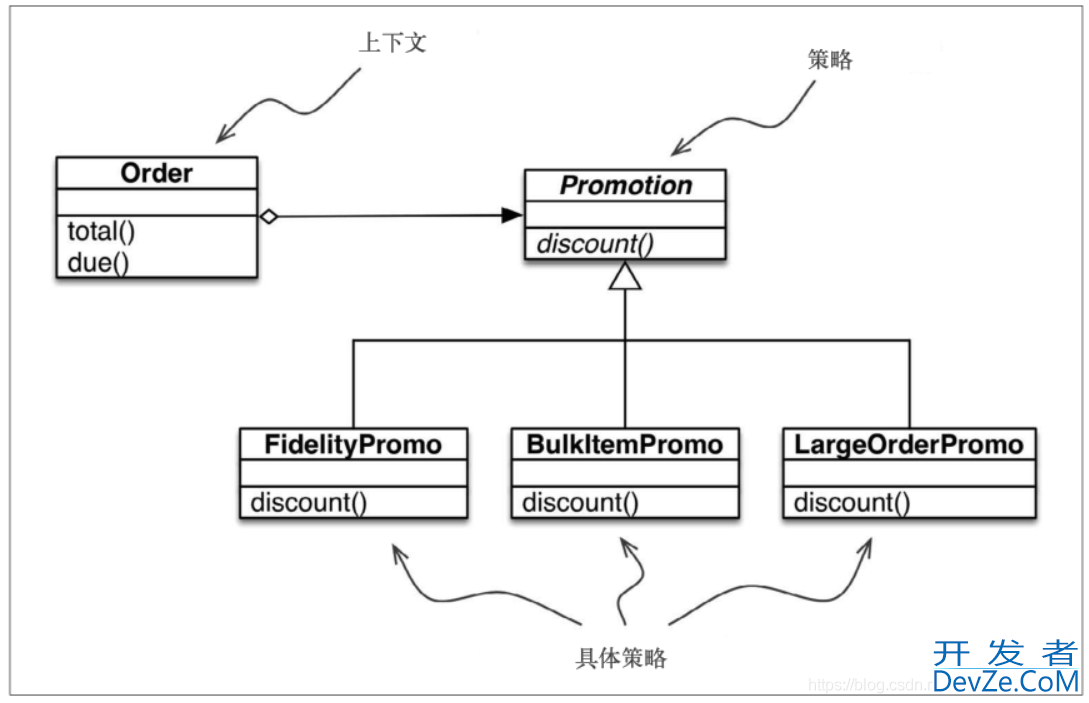Python设计模式中的策略模式详解
目录
- 策略模式
- 命令模式
策略模式
策略模式是一个经典的模式,简化代码。
电商领域有个功能明细可以使用“策略”模式,就是根据客户的属性或订单中的商品计算折扣。
比如一个网店,指定了以下的折扣规则, 并且一个订单只能享受一个折扣:
- 有1000积分以上的顾客,整个订单可以享受5%的折扣
- 同一个订单中,单个商品的数量达到20个以上,单品享受10%折扣
- 订单中不同JTMwSYrI商品的数量达到10个以上,整个订单享受7%折扣
下面是UML类图:

上下文:把一些计算委托给实现不同算法的可互换组建,他们提供服务。 在这个示例中,上下文就是Order,根据不同算法提供折扣。
策略:实现不同算法的组件共同接口。在这个示例中,Promotion的抽象类扮演这个角色。
具体策略:“策略”的子类,实现具体策略
示例,实现Order类,支持插入式折扣策略
import abc
from collections import namedtuple
from abc import abstractmethod
Customer = namedtuple('Customer', 'name fidelity') # name:顾客名字 fidelity:忠诚度,这里用积分体现
class LineItem:
"""单品信息"""
def __init__(self, product, quantity, price):
self.product = product
self.quantity = quantity
self.price = price
def total(self):
return self.quantity * self.price
class Order:
"""订单信息(上下文)"""
def __init__(self, customer, cart, promotion=None):
self.customer = customer
self.cart = list(cart) # 购物车:商品列表
self.promotion = promotion
def total(self):
if not hasattr(self, '__total'): # __前缀的属性,不可继承
self.__total = sum(item.total() for item in self.cart)
return self.__total
def due(self):
"""折后金额"""
if self.promotion is None:
discount = 0
else:
discount = self.promotion.discount(self)
return self.__total - discount
def __repr__(self):
return '<Order total:{:.2f} due:{:.2f}>'.format(self.total(), self.due()) # {:.2f}表示输出小数点,保留2位小数
class Promotion(abc.ABC):
"""策略:抽象基类"""
@abstractmethod
def discount(self, order):
"""返回折扣金额"""
class FidelityPromo(Promotion):
"""具体策略:有1000积分以上的顾客,整个订单可以享受5%的折扣"""
def discount(self, order):
return order.total() * 0.05 if order.customer.fidelity >= 1000 else 0
class BulkItemPromo(Promotion):
"""具体策略:同一个订单中,单个商品的数量达到20个以上,单品享受10%折扣"""
def discount(self, order):
# return order.total() * 0.1 if any(item for item in order.cart if item.quantity >= 20) else 0 理解错误为整体折扣
discount = 0
for iandroidtem in order.cart:
if item.quantity >= 20:
discount += item.total() * .1
return discount
class LargeOrderPromo(Promotion):
"""具体策略:订单中不同商品的数量达到10个以上,整个订单享受7%折扣"""
def discount(self, order):
return order.total() * 0.07 if len({item.product for item in order.cart}) >= 10 else 0
聊一下抽象基类:
python3.4中,声明抽象基类的最简单的方式是继承abc.ABC :class Promotion(abc.ABC):
Python3.0到Python3.3中,必须在class中使用metaclass=关键字 : class Promotion(metaclass=abc.ABCMeta):
Python2中,要在 类属性中增加__metaclass__ = abc.ABCMeta
测试代码
# 两个顾客,一个积分0,一个积分1100
joe = Customer('Joe', 0)
ann = Customer('Ann', 1100)
# 有三个商品的购物车
cart = [LineItem('banana', 4, .5),
LineItem('apple', 10, 1.5),
LineItem('watermelon', 5, 5.0)]
# ann因为超过1000积分,获得了5%折扣
order_joe = Order(joe, cart, FidelityPromo()) #这里要FidelityPromo要加()来创建实例
print(order_joe)
order_ann = Order(ann, cart, FidelityPromo())
print(order_ann)
# 香蕉30个,苹果10个。
banana_cart = [LineItem('banana', 30, .5),
LineItem('apple', 10, 1.5)]
# joe因为香蕉有30个,根据BulkItemPromo 香蕉优惠了1.5元
order_joe = Order(joe, banana_cart, BulkItemPromo())
print(order_joe)
打印
<Order total:42.00 due:42.00><Order total:42.00 due:39.90><Order total:30.00 due:28.50>
以上的模式中,每个具体策略都是一个类,而且只定义了一个方法:discount。此外他们的策略示例没有实例属性,看起来就像普通函数。
示例,使用函数实现折扣策略
Customer = namedtuple('Customer', 'name fidelity') # name:顾客名字 fidelity:忠诚度,这里用积分体现
class LineItem:
"""单品信息"""
def __init__(self, product, quantity, price):
self.product = product
self.quantity = quantity
self.price = price
def total(self):
return self.quantity * self.price
class Order:
"""订单信息(上下文)"""
def __init__(self, customer, cart, promotion=None):
self.customer = customer
self.cart = list(cart) # 购物车:商品列表
self.promotion = promotion
def total(self):
if not hasattr(self, '__total'): # __前缀的属性,不可继承
self.__total = sum(item.total() for item in self.cart)
return self.__total
def due(self):
"""折后金额"""
if self.promotion is None:
discount = 0
else:
discount = self.promotion(self)
return self.__total - discount
def __repr__(self):
return '<Order total:{:.2f} due:{:.2f}>'.format(self.total(), self.due()) # {:.2f}表示输出小数点,保留2位小数
def FidelityPromo(order):
"""具体策略:有1000积分以上的顾客,整个订单可以享受5%的折扣"""
return 开发者_JS开发order.total() * 0.05 if order.customer.fidelity >= 1000 else 0
def BulkItemPromo(order):
"""具体策略:同一个订单中,单个商品的数量达到20个以上,单品享受10%折扣"""
discount = 0
for item in order.cart:
if item.quantity >= 20:
discount += item.total() * .1
return discount
def LargeOrderPromo(order):
"""具体策略:订单中不同商品的数量达到10个以上,整个订单享受7%折扣"""
return order.total() * 0.07 if len({item.product for item in order.cart}) >= 10 else 0
# 两个顾客,一个积分0,一个积分1100
joe = Customer('Joe', 0)
ann = Customer('Ann', 1100)
# 有三个商品的购物车
cart = [LineItem('banana', 4, .5),
LineItem('apple', 10, 1.5),
LineItem('watermelon', 5, 5.0)]
# ann因为超过1000积分,获得了5%折扣
order_joe = Order(joe, cart, FidelityPromo)
print(order_joe)
order_ann = Order(ann, cart, FidelityPromo)
print(order_ann)
# 香蕉30个,苹果10个。
banana_cart = [LineItem('banana', 30, .5),
LineItem('apple', 10, 1.5)]
# joe因为香蕉有30个,根据BulkItemPromo 香蕉优惠了1.5元
order_joe = Order(joe, banana_cart, BulkItemPromo)
print(order_joe)
打印
<Order total:42.00 due:42.00><Order total:42.00 due:39.90><Order total:30.00 due:28.50>
以上可以看到,使用函数更加简单,代码量减少。没必要在新建订单实例化新的促销对象,函数拿来即用。
选择最佳策略
要实现最佳折扣策略的自动选择,只需要一个额外的函数即可。这样就能自动找出最高的折扣。
def best_promotion(order):
promotions = [FidelityPromo, BulkItemPromo, LargeOrderPromo]
return max([func(order) for func in promotions])
自动找出模块中的全部策略
以上的promotions列表包含了三个策略,当再新增新的策略时,需要在这个列表中追加,使用以下写法,可以自动识别策略函数:
示例,实现了把Promo结尾的函数引用,放进promotions列表中
def best_promothttp://www.devze.comion(order):
promotions = [globals()[key] for key in list(globals().keys()) if key.endswith('Promo')]
return max([func(order) for func in promotions])
以上实现的原理就是利用globals()内置函数:
globals()返回一个字典,表示当前的全局符号表。包含了当前所有定义的函数等。
自动找出模块中的全部策略-另一个种方案
把所有的策略函数,都放到一个模块(文件)中,然后通过import导入进来,再使用inspect模块提供的函数内省
示例,获取一个模块中的所有函数
import promotions # 一个包含函数的模块 print(inspect.getmembers(promotions, inspect.isfunction)) # 获取一个模块中的所有函数
打印
[('BulkItemPromo', <function BulkItemPromo at 0x0342F2B8>), ('FidelityPromo', <function FidelityPromo at 0x0342F228>), ('LargeOrderPromo', <function LargeOrderPromo at 0x0342F300>)]
示例,内省promotions模块,获取所有策略函数
import promotions
promotions = [func for func_name, func in inspect.getmembers(promotions, inspect.isfunction)]
def best_promotion(order):
return max([func(order) for func in promotions])
这样的话,以后有新的策略,只需要在promotions模块中新增对应的策略函数,就可以自动加载了,妙!
命令模式
命令模式的目的是解耦调用者(调用操作的对象)和接收者(提供实现的对象)。让他们只实现一个方法execute接口,供调用者使用,这样调用者无需了解接受者的接口,而且不同的接受者可以适应不同的Command子类。
示例,使用抽象类实现命令模式
import abc
class Receiver:
"""命令的接收者,执行命令的地方"""
def start(self):
print('开始执行')
def stop(self):
print('停止执行')
class Command(abc.ABC):
"""命令抽象类"""
@abc.abstractmethod
def execute(self):
"""命令对象对外只提供execute方法"""
class StartCommand(Command):
"""开始执行的命令"""
def __init__(self, receiver):
self.receiver = receiver
def execute(self):
return self.receiver.start()
class StopCommand(Command):
"""停止执行的命令"""
def __init__(self, receiver):
self.receiver = receiver
def execute(self):
return self.receiver.stop()
class Client:
"""命令的调用者"""
def __init__(self, command):
self.command = command
def __call__(self, *args, **kwargs):
return self.command.execute()
start = StartCommand(Receiver())
client = Client(start)
client()
stop = StopCommand(Receiver())
client = Client(stop)
client()
打印
开始执行停止执行
可以不使用抽象类,直接使用一个comman()函数来代理Command示例。使用一等函数对命令模式重新审视。
到此这篇关于Python设计模式中的策略模式详解的文章就介绍到www.devze.com这了,更多相关Python策略模python式内容请搜索我们以前的文章或继续浏览下面的相关文章希望大家以后多多支持我们!






 加载中,请稍侯......
加载中,请稍侯......
精彩评论